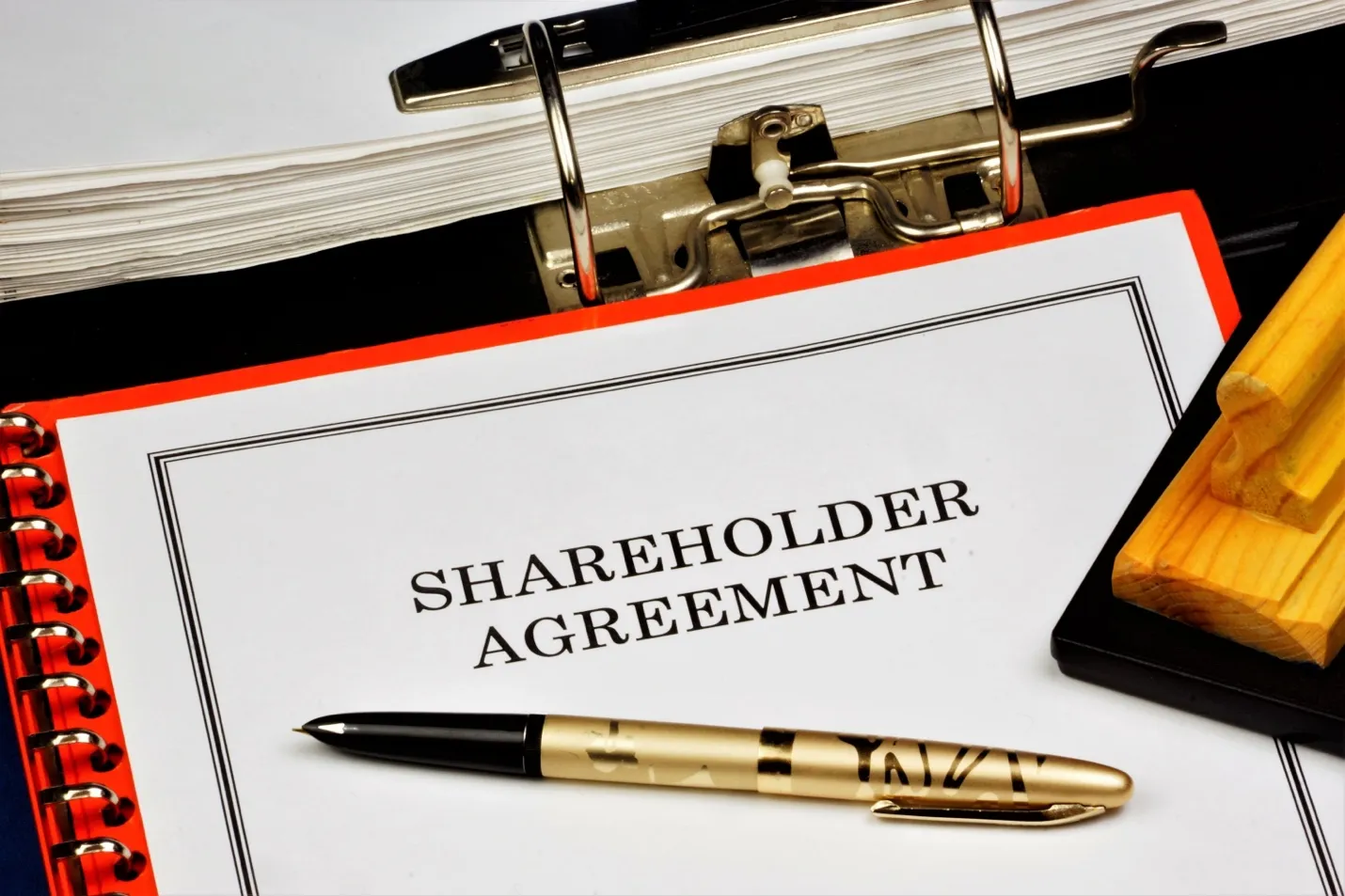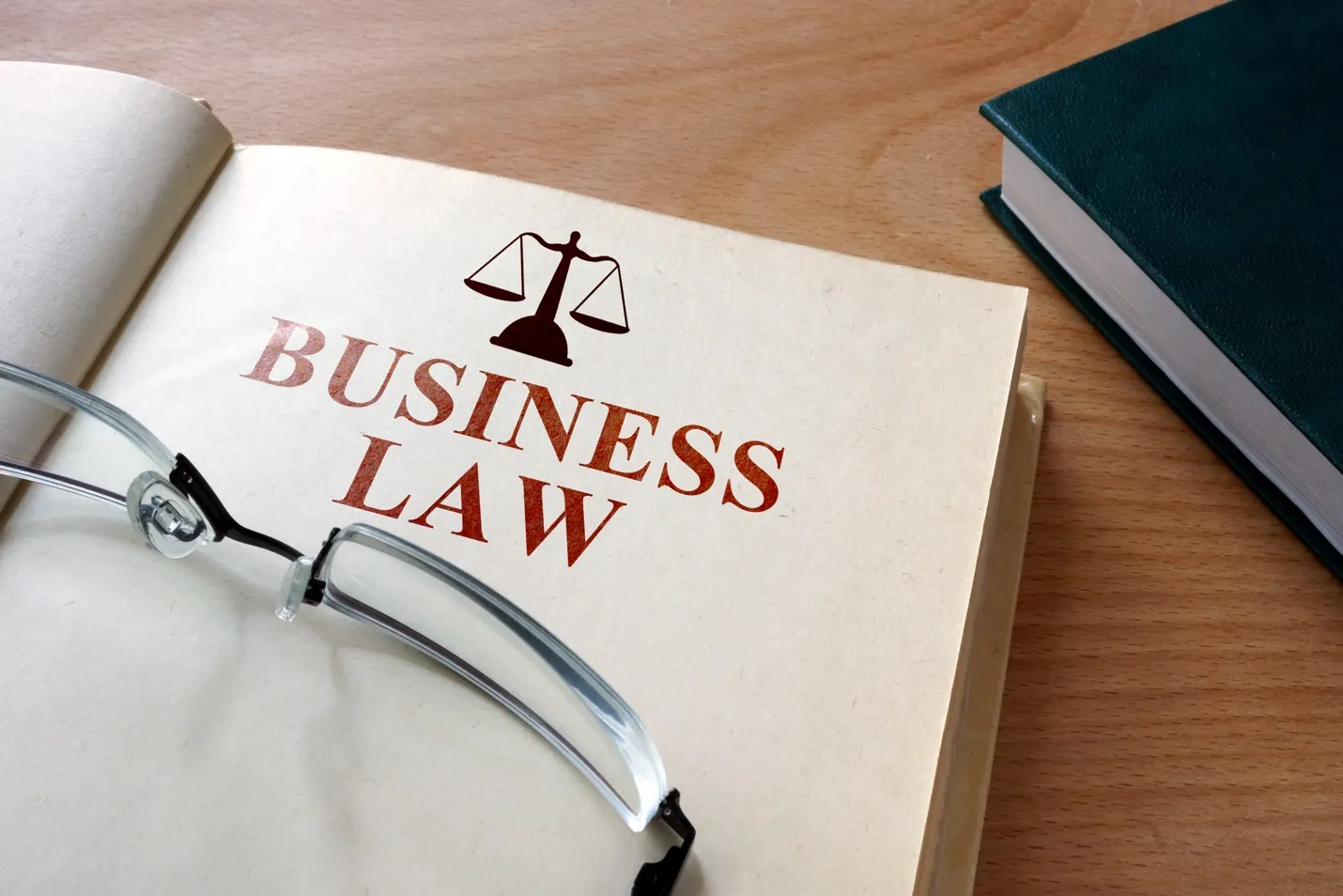Shareholders' Agreements with an Experienced Lawyer!
Shareholder agreements are crucial legal documents outlining the rights, responsibilities, and relationships of shareholders.
Due to the complexities involved in corporate law, it is important to consult a business lawyer for assistance in drafting these agreements to ensure they are comprehensive and compliant with relevant regulations.
An experienced lawyer ensures that the agreement is comprehensive, legally sound, and tailored to the company’s needs, helping to avoid disputes and protect all parties involved.

| In this article, SME Lawyer provides a detailed overview of shareholder agreements and highlights the importance of consulting a business lawyer when drafting one. |
|---|
What Is a Shareholder Agreement?
A shareholder agreement is a private legal contract between the shareholders of a company. Unlike the company’s articles of incorporation, which are public documents governed by corporate law, this agreement is optional and tailored to address specific concerns that may not be covered by general legislation.
It establishes a framework for managing relationships between shareholders and the company, detailing how the business is governed, how decisions are made, and how shares can be transferred or sold.
What Are the Key Elements Typically Included in a Shareholders’ Agreement?
A shareholder agreement is a crucial document that defines the rights, responsibilities, and obligations of shareholders within a company. It helps prevent conflicts by establishing clear guidelines on how the company will be managed and how shareholders will interact with one another.
While the specific content may vary depending on the nature of the company and the needs of its shareholders, several common elements are typically included, such as:
Ownership and Equity Distribution:
The agreement can include a section outlining how the company’s shares are allocated among the shareholders. It specifies each shareholder’s ownership percentage, which is essential for defining voting rights, dividend rights, and other entitlements.
The agreement also addresses the issuance of new shares, detailing the conditions under which the company can issue additional shares and how such actions may impact existing shareholders’ stakes. Additionally, it may include provisions for pre-emptive rights, allowing current shareholders the opportunity to purchase new shares before they are offered to outside parties.
Management and Decision-Making:
The shareholder agreement defines the company’s management structure, including details on the appointment and removal of directors. It specifies how major decisions will be made, whether through majority votes or a different voting threshold.
For certain critical decisions, such as mergers, acquisitions, or changes in company structure, the agreement may require unanimous approval or a supermajority vote. By clearly outlining these processes, the agreement ensures that decision-making is efficient and transparent, helping to prevent disputes and misunderstandings among shareholders.
Roles and Responsibilities of Shareholders:
The agreement can outlines the specific roles and contributions expected from each shareholder. For instance, a shareholder may be required to provide funding, expertise, or other resources to the company. Defining these roles helps ensure that all parties understand their obligations, thus contributing to the smooth operation of the business.
Transfer of Shares:
Rules regarding the transfer of shares are a vital component of any shareholder agreement. The agreement specifies conditions under which shareholders can sell, transfer, or otherwise dispose of their shares. It may include restrictions to prevent the shares from being sold to unwanted third parties, thus maintaining control within a selected group of individuals.
Common provisions include rights of first refusal, where existing shareholders are given the opportunity to buy shares before they are sold to an outsider. Additionally, the agreement may outline the process for valuing shares to ensure fair transactions.
Dividends and Profit Distribution:
The agreement can specifies how profits will be shared among shareholders. It may establish a fixed dividend payout ratio or leave it to the discretion of the board of directors. Clear rules on profit distribution help prevent conflicts and ensure that shareholders have a common understanding of how the company’s earnings will be managed.
Dispute Resolution Mechanisms:
Conflicts can arise in any business, and having a clear dispute resolution process is essential. The shareholder agreement typically includes provisions for resolving disputes through mechanisms such as mediation, arbitration, or other alternative dispute resolution methods.
These processes are often faster and less costly than litigation, helping to maintain a harmonious business environment even when disagreements occur.
Exit Strategies and Conditions:
The agreement addresses scenarios where a shareholder wishes to exit the company, such as selling their shares, retiring, or leaving due to other reasons. It outlines the conditions under which shares can be sold or transferred, ensuring that the process is smooth and equitable.
The agreement may also cover situations involving the death or incapacity of a shareholder, providing guidelines for how their shares will be handled. Buyout provisions, including how to value the shares and who can purchase them, are typically detailed to facilitate an orderly exit.
Confidentiality and Non-Compete Clauses:
To protect the company’s interests, the agreement usually includes confidentiality provisions that restrict shareholders from disclosing sensitive information to third parties. Additionally, non-compete clauses may prevent shareholders from engaging in activities that compete directly with the business, thereby safeguarding the company’s competitive edge.
These clauses help ensure that shareholders do not misuse their access to critical business information for personal gain or to the detriment of the company.
Financing Arrangements:
Details on how the company will secure funding, whether through loans, equity, or other means, can also be included. It specifies how this impacts existing shareholders, ensuring clear terms for future capital contributions.

These sections collectively ensure that shareholders’ interests are protected and that the company operates smoothly, with clear rules for governance, profit sharing, and conflict resolution.
Why Do Corporations Need a Shareholder Agreement?
Having a shareholder agreement in place provides a solid foundation for the smooth operation and governance of a company. Here are some key reasons why corporations benefit from this essential document:
| Reason | Explanation |
|---|---|
| Preventing disputes | A shareholder agreement acts as a preventive measure against potential conflicts. By clearly outlining the roles, rights, and responsibilities of shareholders, it reduces the likelihood of disputes. |
| Enhancing operational efficiency | By establishing clear guidelines for how decisions are made, the agreement prevents deadlock situations and allows the company to function smoothly. |
| Planning for the future | A well-crafted shareholder agreement is essential for future planning, addressing scenarios such as the exit or death of a shareholder. It includes provisions that ensure a smooth transfer of shares and help prevent forced sales that could disrupt the business. |
| Facilitating investment and capital raising | The agreement also establishes guidelines for raising new capital and issuing shares, making the company more attractive to potential investors. By clearly outlining how new shares can be issued and how existing shares can be transferred, the agreement provides a stable foundation for future growth and investment. |
| Maintaining confidentiality and competitive advantage | Confidentiality clauses in the agreement protect sensitive company information, helping to maintain a competitive edge. Additionally, a non-compete clause prevents shareholders from starting rival businesses, further safeguarding the company’s interests. |
Overall, a shareholder agreement is essential for fostering long-term cooperation and trust among shareholders. It creates a stable, predictable environment that allows the company to operate efficiently, manage potential disputes, and plan for future growth, all while safeguarding the interests of the shareholders.
General Shareholder Agreement vs. Unanimous Shareholder Agreement
It’s important to note that there are two primary types of shareholder agreements:
- General shareholder agreement
- Unanimous shareholder agreement
General Shareholder Agreement:
A general shareholder agreement is a flexible contract among some or all shareholders of a company. It can be customized to cover specific issues, such as share transfers, dividend policies, or dispute resolution, without requiring unanimous consent.
This flexibility allows a subset of shareholders to create agreements tailored to their needs, though it may lead to complex negotiations due to differing interests. Importantly, general shareholder agreements do not change the company’s governance, which remains under the board of directors’ control.
Unanimous Shareholder Agreement:
A unanimous shareholder agreement is a more structured contract that requires the consent of all shareholders, binding both current and future shareholders. Unlike a general agreement, a unanimous shareholder agreement allows shareholders to assume powers usually held by the board, altering the company’s governance.

This enables shareholders to manage key aspects like voting, strategic decisions, and financial policies directly. By redistributing these powers, a unanimous shareholder agreement streamlines decision-making but also adds legal responsibilities to shareholders.
Key Differences:
The main distinction between the two agreements lies in their flexibility and impact.
- A general shareholder agreement is adaptable and suited for addressing specific needs without altering governance.
- In contrast, a unanimous shareholder agreement imposes a more rigid framework, granting shareholders direct control over management decisions, requiring unanimous consent, and binding all shareholders.
Companies should assess their governance needs and seek legal advice to choose the appropriate agreement.
Why is Hiring a Business Lawyer Essential for Drafting Shareholders’ Agreements?
Drafting a shareholders’ agreement might seem straightforward, but it encompasses numerous legal nuances that require in-depth understanding and foresight. Business lawyers play a crucial role because they are equipped to navigate complex legal frameworks and anticipate potential issues that may not be apparent during the initial setup.
Below are the key reasons why hiring a business lawyer is vital when creating a shareholders’ agreement:
Customized Legal Drafting
One of the primary reasons to engage a business lawyer is the need for tailored legal drafting. Every business is unique, and a generic shareholders’ agreement template may not adequately address specific needs. Lawyers can customize the agreement to reflect the company’s distinct structure, goals, and shareholder arrangements.
For instance, the agreement for a family-owned business may differ significantly from that of a tech startup, where shareholders might have diverse roles and investment stakes. A business lawyer’s role includes asking the right questions to understand the shareholders’ intentions and expectations.
Assistance with Negotiation
Drafting a shareholders’ agreement often involves negotiations among shareholders to ensure that everyone’s interests are represented fairly. A business lawyer can act as a mediator during these discussions, offering impartial advice and helping parties reach a consensus.
They can also advocate on behalf of their clients to ensure that their rights and interests are adequately protected, which is particularly useful in cases where there is a power imbalance among shareholders.
Ensuring Compliance with Laws and Regulations
Another critical role of a business lawyer is to ensure that the shareholders’ agreement complies with all applicable laws and regulations. Corporate laws vary across jurisdictions, and business lawyers are skilled in navigating these legal landscapes.
They can advise on matters such as taxation, securities regulation, and corporate governance, ensuring that the agreement does not violate any legal provisions that could lead to penalties or legal challenges in the future.

Additionally, they can keep the agreement updated with changing laws and regulations, ensuring that businesses remain compliant and avoiding legal complications that may arise from outdated clauses.
Include Clauses Addressing Key Scenarios and Contingencies
One of the primary reasons why hiring a business lawyer is crucial for drafting shareholders’ agreements is their expertise in addressing various scenarios and contingencies that can arise in the lifecycle of a business. Shareholder relationships are inherently complex, and as the business evolves, different situations can emerge, creating the potential for conflict and misunderstanding.
A well-drafted shareholders’ agreement created by an experienced business lawyer, helps to preemptively address these issues by including clauses that specifically address critical scenarios and contingencies.
Here are some of the most important scenarios a business lawyer can account for in a shareholders’ agreement:
Voluntary Withdrawal of a Shareholder
The voluntary withdrawal of a shareholder is one of the most common and potentially disruptive scenarios for any business. When a shareholder decides to exit, the remaining shareholders often face the challenge of buying out the exiting party’s shares.
Without proper legal guidance, the process can lead to disputes, financial strain, or even an unfair valuation of the departing shareholder’s shares. A business lawyer will draft a clear procedure for voluntary withdrawal, ensuring that:
- The rights of the remaining shareholders are protected.
- The exiting shareholder receives fair compensation for their shares.
- There is a method for valuing shares that is agreed upon in advance, minimizing disputes.
A clear, pre-determined process for voluntary withdrawal not only ensures fairness but also helps the business maintain operational stability during shareholder transitions.
Forced Withdrawal
In certain situations, shareholders may need to be forced to withdraw due to unforeseen circumstances, such as personal bankruptcy, legal issues, or a failure to meet their obligations to the company. Forcing a shareholder to exit the business can be a sensitive issue, especially if it involves contentious circumstances like imprisonment or financial trouble.
A business lawyer can draft clauses that define:
- The specific conditions under which a shareholder can be forced to withdraw (example: financial insolvency, illegal activities, breach of fiduciary duty).
- The process for compensating the departing shareholder, even in forced situations.
- Clear safeguards to prevent this mechanism from being misused during shareholder disputes.
Such clauses are essential for protecting the integrity and stability of the business while also ensuring that the forced withdrawal process is transparent and fair.
Conflict Resolution: The Shotgun Clause
Disagreements between shareholders are inevitable, and without pre-set dispute resolution mechanisms, these conflicts can escalate and damage the business. One common solution to irreconcilable conflicts is the shotgun clause, which allows one shareholder to either buy out another’s shares or sell their own shares at a set price.
The shotgun clause provides a fast resolution in deadlock situations. However, it is also a drastic mechanism that needs to be used carefully. A business lawyer can ensure that:
- The shotgun clause is fair, especially when the financial capacity of the shareholders differs.
- The terms for invoking the clause are clearly defined and agreed upon by all shareholders.
- The clause is structured to prevent any shareholder from using it to unfairly oust others or take advantage of the situation.

This clause is especially useful when there is a major deadlock or discord between two shareholders, but it requires careful legal drafting to avoid unintended consequences.
Death or Disability of a Shareholder
The death or incapacitation of a shareholder can have significant implications for a business, particularly if the deceased’s estate or family becomes involved.
It is vital for the shareholders’ agreement to address what happens in the event of a shareholder’s death or disability, as this prevents unintended parties from inheriting shares and potentially interfering with the company’s operations. A business lawyer will help by drafting provisions that:
- Automatically trigger the buyout of shares upon the death or incapacitation of a shareholder.
- Establish a funding mechanism (such as life insurance policies) that ensures the company has the necessary resources to purchase the shares from the deceased shareholder’s estate.
- Clarify how the valuation of the shares will be handled to ensure a fair process for both the business and the deceased shareholder’s heirs.
By proactively addressing these contingencies, the shareholders’ agreement helps avoid disputes and ensures the smooth continuation of the business.
Acquisition by a Third Party
Another critical scenario that can arise is the acquisition of shares by a third party. Without adequate provisions in the shareholders’ agreement, a third-party shareholder could disrupt the balance of ownership and the strategic direction of the company. A business lawyer can help prevent this by drafting clauses that regulate the transfer of shares to third parties.
These clauses may include:
- Right of First Refusal: This clause gives the existing shareholders the opportunity to buy shares before they are offered to an outside party, allowing them to maintain control over the ownership structure of the company.
- Tag-Along Rights: This clause protects minority shareholders by allowing them to “tag along” if a majority shareholder decides to sell their shares to an external buyer. This ensures that minority shareholders receive the same price and terms as the majority shareholder.
- Drag-Along Rights: In contrast to tag-along rights, drag-along rights allow a majority shareholder to force minority shareholders to join in the sale of shares, ensuring that a potential buyer can acquire 100% of the company.
By including these provisions, a business lawyer ensures that the company’s shareholders retain control over who becomes a new shareholder and that all parties are treated fairly in the event of a sale.
Share Valuation and Payment Mechanisms
Another essential aspect of any shareholders’ agreement is the method for valuing shares during buyouts or sales. Whether triggered by voluntary withdrawal, forced exit, or death, the valuation of shares is often a point of contention. A business lawyer can draft clauses that define how shares will be valued, using methods such as:
- Fair Market Value: Determined by an independent third-party valuation expert.
- Book Value: Based on the company’s financial records.
- Pre-Agreed Formula: A set method for calculating the value of shares based on predefined financial metrics.
Additionally, a lawyer can draft payment mechanisms, including lump sum payments or structured payments over time, to accommodate the financial needs of both the buyer and the seller.
Find the Perfect Business Lawyer for Your Shareholders’ Agreement with SME Lawyers!
When drafting a shareholders’ agreement, hiring a business lawyer is essential for ensuring its effectiveness and legal compliance. A well-crafted agreement governs shareholder relationships and addresses critical issues like voluntary and forced withdrawals, shareholder conflicts, share transfers, and other important matters.
Without a lawyer’s expertise, businesses risk creating vague or inadequate agreements that may lead to disputes and financial losses. Lawyers provide tailored solutions, protect shareholder interests, and create enforceable terms that enhance operational stability.

By investing in legal guidance, companies can foster harmonious relationships among shareholders, preventing conflicts and securing their future success in a competitive business landscape!
Looking for a business lawyer? SME Lawyers is a simple, fast and free way to find the perfect business lawyer! All you have to do is fill in our request form and tell us about your situation.
Following your request, we will quickly put you in touch with a lawyer near you. There is no obligation on your part!
